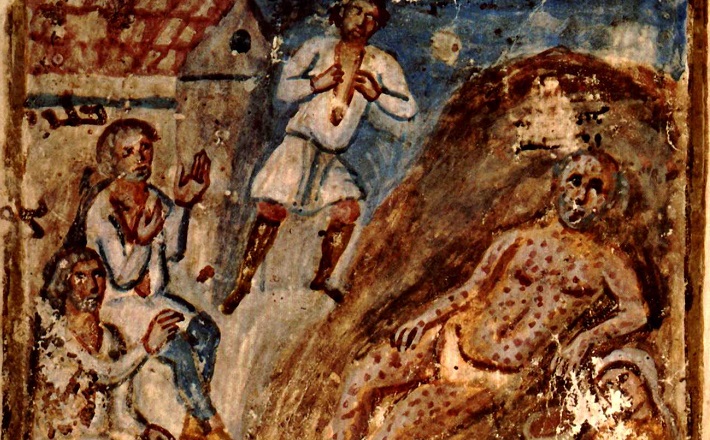Commentary on Hebrews 1:1-4; 2:5-12
One might wonder at the selection of this text set in conversation with that of Job and the Markan text on divorce and “the little children.”
Though connections might be made through Psalm 8 (it is quoted in the Hebrews’ text), it is perhaps best simply to note that this is the first selection from Hebrews in the RCL Sunday readings of “Year B” that will continue for seven consecutive weeks, through Proper 28. This period represents the highest concentration of texts from Hebrews in the 3-year RCL. In Year C there is a 4-week run that oddly finishes out the reading of Epistle begun this year in next year’s Propers 14-17 (in late summer/early fall). If a parish were interested in spending some time with the Epistle to Hebrews in focused Bible study, the weeks ahead provide the natural time to do so. The first four verses of Hebrews also provide the second lesson for Christmas Day (III) for all three years of the RCL. Additional commentary may be found in the text study of that festive day of the church year.
In addition to the random introduction of Hebrews into the lectionary readings for this Sunday is a significant problem of translation which comes as a consequence of the NRSV’s laudable commitment to inclusive language. This is an important but complicated issue. I trust the preacher will find value in its exposition.
In Hebrews 2:5-8 (NRSV) Psalm 8 is cited as follows:
Now God did not subject the coming world, about which we are speaking, to angels. But someone has testified somewhere, “What are human beings that you are mindful of them, or mortals, that you care for them? You have made them for a little while lower than the angels; you have crowned them with glory and honor, subjecting all things under their feet.
The sense seems to be that the text is talking about us — regular folk — human beings. Compare, however, the NET translation:
For he [God] did not put the world to come, about which we are speaking, under the control of angels. Instead someone testified somewhere: “What is man that you think of him or the son of man that you care for him?You made him lower than the angels for a little while. You crowned him with glory and honor. You put all things under his control.”
The NET text is about “the Son of Man,” a Christological title that refers to Jesus. This allusion simply cannot be discerned in the NRSV translation. What has happened? In the NRSV, the problem of the non-inclusive Greek “son of man” (huios anthropou) is solved by making the singular nouns plural. So “human being” (anthropos) becomes “human beings” and the “son of man” becomes “mortals.” This is justified by reference to the English translation of Hebrew text of Psalm 8, where the Hebrew constructions, though singular, can be properly understood to be collective nouns set in synonymous parallelism.
The problem with the translation, however, is that the author of Hebrews was not working with the Hebrew text, but the Greek translation of the Jewish scriptures, the Septuagint (LXX). There, the Hebrew is already translated as huios anthropou “son of man.” In short, the author of Hebrews — as did the early church in general — read Psalm 8 as revelatory of Christ, not about humanity in general.
The comparison of “the Son” with the angels is introduced in Hebrews 1:1:4. At the enthronement of Jesus at the right hand of God (a reference to Psalm 110:1; cf.; Hebrews 1:13), Jesus becomes “as much superior to angels as the name [kyrios, “Lord,” see Psalm 110:1; cf. Philippians 2:9] he has inherited is more excellent than theirs.” Then follows a “chain” (catena) of Old Testament citations that compares the “Son” to “angels” to evidence the superiority of Jesus (Hebrews 1:5-14).
It is somewhat difficult for us, perhaps, to understand the necessity of such an involved midrash on the relationship between Jesus and the angels. What lies in the background, however, is the death of Jesus. The theological question being addressed is, “How can the earthly Jesus who was crucified by the Romans be ‘more excellent’ than angels, who — though created — are of the spiritual order? On the face of it, the claim seems foolish. Incorruptible spirit should trump weak and mortal flesh. The theological answer to this logical question of how Jesus is superior begins in Hebrews 2:9. Jesus dies “so that by the grace of God, he might taste death for everyone.” Just outside of today’s text — part of next Sunday’s reading — we hear, the purpose of the Incarnation succinctly stated: “Since, therefore, the children share flesh and blood, he himself likewise shared the same things, so that through death he might destroy the one who has the power of death, that is, the devil, and free those who all their lives were held in slavery by the fear of death.” Why did the Son of Man, for a time, descend “lower than the angels?” The Son of God becomes vulnerable and weak flesh in order that the power of death might be destroyed.
It is sometimes said that the ancient and the modern Christological heresies are mirror images of one another. Moderns understand well that Jesus was human, but have a difficult time imagining how he might be God. The ancients, on the other hand, could well imagine that Jesus was divine, but struggled with his humanity. Hebrews speaks to those ancients who could not imagine divinity experiencing “sickness unto death” (cf. John 11:4). In fact, the Epistle’s unique use of the Old Testament figure of Melchizedek speaks precisely to this point. Melchizedek was immortal (Hebrews 7:3), yet Jesus dies. In the upside-down world of incarnational theology, it is the death of Jesus that reveals the grace of God, not the eternal priesthood of Melchizedek. Orthodox Christology, which I discern in Hebrews, confesses, in fact, that the Son is fully divine and fully human. This, of course, explains nothing. It simply functions to protect the mystery of the Incarnation from easy domestication.
The problems with the NRSV translation of this text might seem to provide a challenge for the preacher. Luckily, the text interprets itself at Hebrews 2:9: “ … Jesus, who for a little while was made lower than the angels, [is] now crowned with glory and honor.” Though the price of the Incarnation was high (and forever lies outside of our comprehension), it was for our benefit. Only by passing through death was death — and, therefore, the fear of death — destroyed. May we live in the assurance that this is most certainly true.


October 4, 2015